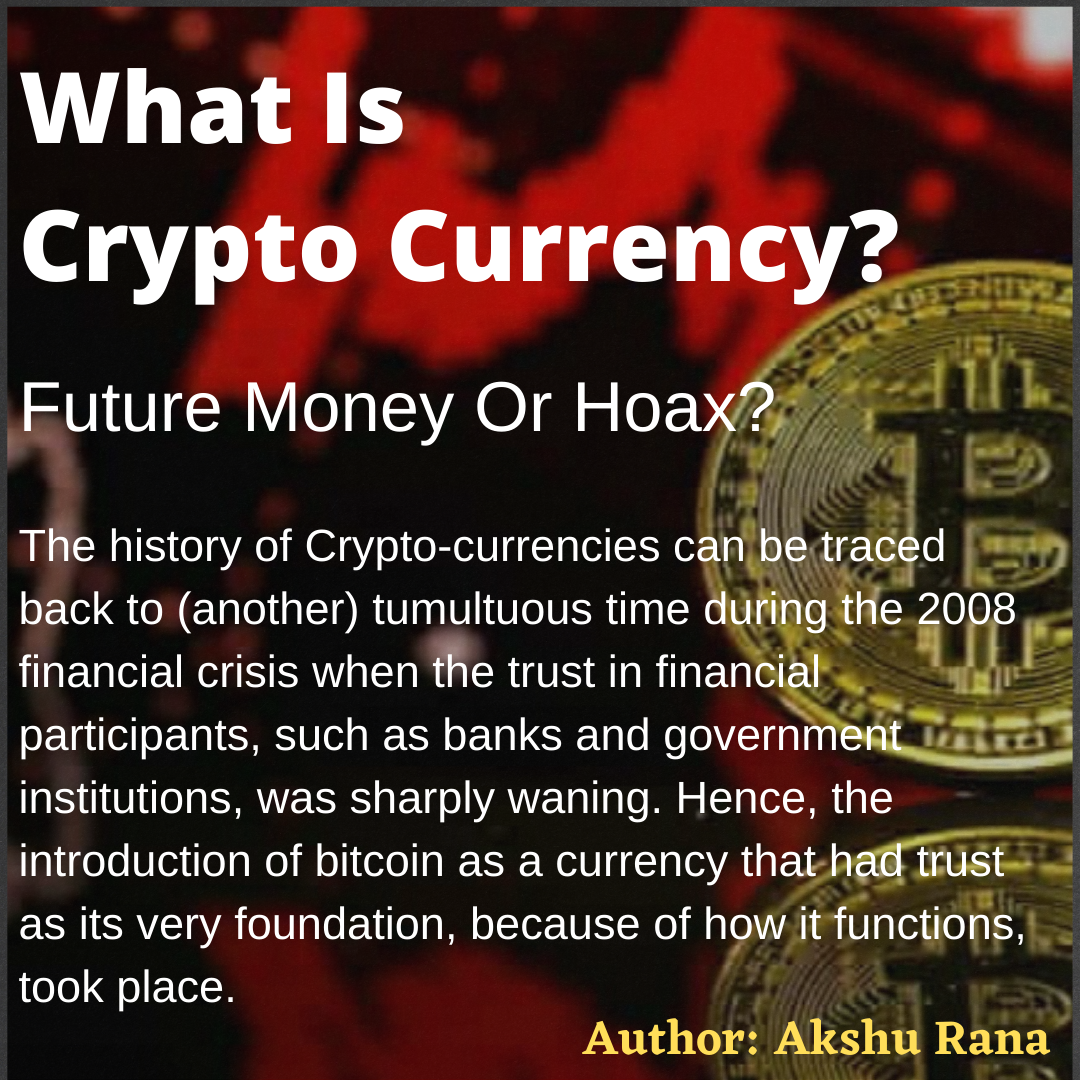
What Is Cryptocurrency? | Future Money Or Hoax?
AUTHOR : AKSHU RANA
The history of Crypto-currencies can be traced back to (another) tumultuous time during the 2008 financial crisis when the trust in financial participants, such as banks and government institutions, was sharply waning. Hence, the introduction of bitcoin as a currency that had trust as its very foundation, because of how it functions, took place. Bitcoin is underpinned by a decentralised and distributed ledger technology called “Block chain“. It was described by the authors of the book – The Truth Machine: The Block chain and the Future of Everything, block chain technology produces “an immutable” ledger that is not controlled by a single, centralized entity but by a “consensus protocol” thereby making the ledger a “shared record of the truth”.
The Bitcoin
Bitcoin remained relatively unknown in its initial years and did not have a “price” – not to be confused with “value” – until 2010-11. There was a surge in its popularity which led to an increase of its traded/exchanged price. In the year 2013, when the European Union bailed out Cyprus, Cypriot citizens bought Bitcoins fearing collapse of their financial systems, which led to a surge in Bitcoins’ demand and price.
So the trustworthiness of the underlying Block chain technology and the removal of financial system intermediaries from the transaction framework are the major factors that contributed to Bitcoin’s popularity. As the popularity of bitcoin increased, other Crypto-currencies also came to be introduced. In the year 2018 the price of Bitcoin peaking at nearly USD 20,000, Crypto-currencies could no longer be ignored.
The Market Rise
As there was a gain in popularity of cryptocurrency , they also began to garner interest, intrigue and suspicion from governments, central banks and regulators. Studies were conducted, papers were published, and a general consensus emerged that cryptocurrency cannot be given the status of legal tender. There is a significant variation of range in the studies, with countries like Japan, Germany and The Netherlands taking a more lenient regulatory approach, and countries such as India and China effectively banning cryptocurrency dealing.
The regulatory stance in various jurisdictions continues to evolve, we answer some conceptual questions surrounding cryptocurrencies and its regulation in India.
What Are Crypto Currencies?
Crypto-currencies can be defined as digital representations of value that can be stored and transferred digitally. As it is suggested in the name, crypto-currencies work through the use of cryptography i.e. principles of mathematics and of computational practices using which data is stored and transmitted.
The crypto-currencies which are very popular are Bitcoin and XRP (Ripple), others that have been in the talk include Shiba, Doge etc.
How Are Crypto Currencies Different From Fiat Currency?
• Fiat currency, or what we call “money”, is legal tender backed by a country, state or government. A country doesn’t back the cryptocurrency , state or government.
Fiat currency has the following characteristics or functions:
(a) it serves as a medium of exchange;
(b) it acts as a unit of account;
(c) it acts as a store of value; and
(d) it constitutes a final discharge of debt.
In Crypto currency, it can have all or some of the characteristics of fiat currency. The very much dependency of it is on how a jurisdiction regulates cryptocurrency. Even some countries have gone to the extent of banning cryptocurrency, others have given it commodity, asset, deposit or security status.
Cryptocurrency does not have a ‘legal tender’ status in any country or state. Many states have though, at some instance or the other, recognised the use of this currency, none has ever legally accepted their trade under the legislations. Recently, a bill, The Cryptocurrency and Regulation of Official Digital Currency Bill 2021, was proposed by the RBI, before the parliament, which seeks to create an official digital currency issued by the RBI. It further proposes a ban on the rest of the private currency, along with certain exceptions. The Bill has been listed in the Lok Sabha. It is most likely to be introduced in the upcoming winter session.
Mail us at edumoundofficial@gmail.com






